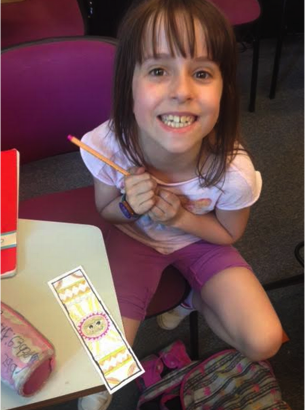
Kids Culture Club
April 13, 2015
To kick off the class Michaela´s Kids´ Club group discussed what the perfect class is like and made rules accordingly.
In the spirit of poetry month the group read a funny poem by Linda A. Anderson entitled “When Noses Bloom”. The Kids continued by creating their own poems about odd body parts and sharing them with the group.
Para empezar el último trimestre de Kids´Club el grupo de Michaela habló de cómo sería la clase perfecta. Luego inventó reglas para ayudar a la clase.
En el mes del espíritu de la poesía el grupo leyó un poema gracioso de Linda A. Anderson titulado ¨When Noses Bloom”. El grupo creó sus propios poemas sobre partes del cuerpo raras y las compararon unas con otras.
When Noses Bloom Linda A. Anderson
I started life with a small nose,
tiny hands, fingers and toes;
I grew in spurts, then with a boom,
my little nose burst into bloom.
My body parts all grew apace,
except the middle of my face–
in growth it never showed a lack,
it was the leader of the pack.
It left the rest of me behind.
At first I didn’t even mind;
then when its bloom was almost done,
my nose became a source of fun.
My friends tagged me with stupid names.
This was one of their favorite games–
pain comes with more than sticks and stones;
I told them, “Leave my nose alone!”
Then once my nose had reached its peak,
proclaimed by some a handsome beak,
I found its size to be a plus,
and not a thing for animus.
There are so many things to smell,
not all the noses do it well;
mine can suck in all the scents,
from fragrant blooms to moldy tents.
It keeps my lips dry in the rain,
locates a skunk and warns my brain;
all races I win “by a nose”;
in winter’s cold it starts to glow.
Those small nosed people now despair,
they wish they had a nose so rare!
This nose of mine has grown on me;
I’m pleased with it as I can be!
Though it won’t ever be called cute–
it’s too much like a yellow fruit–
at least it’s left the blooming stage,
unless it grows more in old age!
April 20, 2015
To celebrate Earth Day (April 22, 2015) Michaela´s Kids´Club Group read “Flower Garden”, by Eve Bunting. The group then had a look at Nickelodeon’s Earth Day promotional commercial and saw how other children are making efforts to help the Earth.
The Kids then created their own campaign to “Give the Earth a Hand”
Para celebrar el Día de la Tierra (22 Abril 2015) el grupo de Kid´s Club de Michaela leyó “Flower Garden”, de Eve Bunting. Luego el grupo vio un video promocional de Nickelodeon´s “Earth Day” para ver como otros niños están intentando ayudar al mundo.
Ellos crearon sus campañas para “Echarle una mano al mundo.”
May 4, 2015
The Kids focused on the pursuit of dreams and never giving up. The group read “Mirroring Miranda”. They learned all about Miranda’s trials and tribulations in pursuing her dream to become a science fiction novelist.
They then listened to some inspiring words from Kid President and created their own hot air balloons displaying their dreams.
El grupo se concentró en el tema de cómo perseguir los sueños y de no rendirse nunca. Ellos leyeron ¨Mirroring Miranda¨. Aprendieron sobre los aventuras de Miranda mientras perseguía su sueño de ser novelista de ciencia ficción.
Después escucharon algunas palabras inspiradoras del Kid President y crearon sus propios globos aerostáticos enseñando sus sueños.
May 11, 2015
As May is Asian Pacific Heritage Month the group read some interesting chapters from Jackson Kitchells’s “India”. The group also learned about India´s famous Diwali festival and had first hand accounts of India from Luna and Eva.
The kids then designed their own bookmarks using Madhubani techniques.
Como el mes de Mayo es Asian Pacific Heritage Month el grupo leyó algunos capítulos interesantes de “India” de Jackson Kitchell. También el grupo aprendió sobre el famoso festival de la India, Diwali Festival y escuchó historias de India de Luna y Eva.
Los alumnos diseñaron sus propios marcapáginas usando métodos Madhubani.










